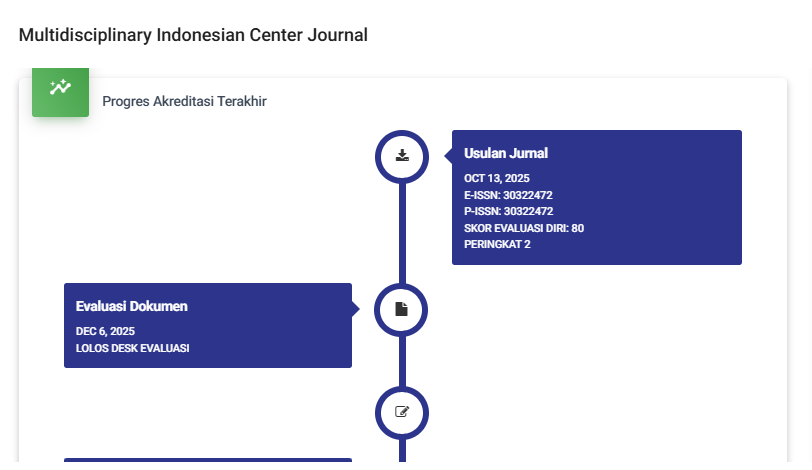GENDER ISSUES IN PUBLIC SPACES WITHIN MUSLIM COMMUNITIES: A SYSTEMATIC LITERATURE REVIEW
DOI:
https://doi.org/10.62567/micjo.v2i4.1483Keywords:
Gender equality, public space, muslim communitiesAbstract
Gender issues in public spaces and Muslim communities have increasingly gained attention in academic discourse due to their strong connection with social norms, cultural values, and religious interpretations that shape women's patterns of participation. This study aims to examine the influence of gender norms and values within Muslim communities on women’s engagement in public spaces, uncover the challenges they face, and formulate recommendations based on feminist and social constructionist perspectives to promote gender equality. The research employs a Systematic Literature Review (SLR) method by tracing reputable academic databases through rigorous selection and thematic analysis. The findings reveal that Muslim women’s participation in public spaces is often hindered by patriarchal constructions, discrimination, and limited access. Nevertheless, women have developed strategies of resistance and negotiation that expand their roles. Thematic analysis identifies three main patterns: women’s representation in public spaces, gender-based social practices that impose limitations, and resistance strategies through religious reinterpretation and community activism. This article contributes to theoretical development by enriching global feminist perspectives through the lived experiences of Muslim women while also offering practical contributions in the form of inclusive and socially–religiously sensitive public policy recommendations. The implications highlight the importance of cross-cultural studies and the exploration of women’s experiences at the local community level to broaden understanding of gender equality in contemporary Muslim societies.
Downloads
References
Akhmedova, M., & Bakaeva, A. (2021). Gender equality in Islam: The role of women in public life. Journal of Critical Studies in Religion, 19(3), 211–225. https://doi.org/10.1080/21567689.2021.1947536
Alkhateeb, H. (2020). Social constructions of Muslim women’s roles: Between tradition and modernity. Journal of Gender Studies, 29(5), 569–582. https://doi.org/10.1080/09589236.2020.1714102
Ali, F., & Bagheri, A. (2020). Women and public space in Muslim societies: A systematic review. International Journal of Gender Studies, 12(4), 433–450. https://doi.org/10.1080/14480220.2020.1783209
Anjum, O. (2021). Negotiating faith and gender: Muslim women in the public sphere. Contemporary Islam, 15(2), 123–141. https://doi.org/10.1007/s11562-020-00455-7
Arat-Koç, S. (2019). Feminism, multiculturalism, and Muslim women: Navigating public discourse. Social Politics, 26(1), 45–68. https://doi.org/10.1093/sp/jxy027
Azmi, I. A. G., & Musa, R. (2022). Women’s participation in the workforce in Muslim-majority countries: A gender perspective. Asian Journal of Women’s Studies, 28(2), 133–152. https://doi.org/10.1080/12259276.2022.2057103
Badran, M. (2019). Islamic feminism: Negotiating patriarchy and faith. Gender & Society, 33(4), 579–602. https://doi.org/10.1177/0891243219841452
Bano, M. (2022). Female agency and resistance in Muslim societies. Women’s Studies International Forum, 90, 102553. https://doi.org/10.1016/j.wsif.2021.102553
Bilge, S. (2020). Intersectionality in Muslim women’s studies: Methodological reflections. Signs: Journal of Women in Culture and Society, 45(2), 403–423. https://doi.org/10.1086/705382
Fadil, N., & Fernando, M. L. (2019). Rediscovering the public sphere: Muslim women’s activism in Europe. Ethnic and Racial Studies, 42(3), 375–392. https://doi.org/10.1080/01419870.2018.1534220
Farid, M. (2025). Religion, gender and race in Western European arts and culture. Springer. https://link.springer.com/article/10.1007/s12119-025-10382-9
Hamid, S., & Khalid, M. (2021). Muslim women in public life: Between empowerment and restriction. Journal of Muslim Minority Affairs, 41(2), 143–160. https://doi.org/10.1080/13602004.2021.1933629
Haque, A. (2021). Muslim women and public engagement: Negotiating cultural and religious barriers. Contemporary Sociology, 50(4), 373–389. https://doi.org/10.1177/0094306121101152
Jamal, A., & Sharabi, H. (2020). Patriarchy, politics, and public space: Women in Muslim societies. Middle East Journal, 74(1), 39–56. https://doi.org/10.3751/74.1.11
Ledesma, E., & Delgado, L. E. (2025). The Routledge Hispanic studies companion to twentieth and twenty-first century Spain. Routledge. https://www.academia.edu/download/121588198/Routledge_Companion_Preview.pdf
Mahmood, S. (2021). Rethinking Muslim women’s agency in the public sphere. Feminist Review, 127(1), 12–27. https://doi.org/10.1177/01417789211034852
McCann, L., Bozkurt, Ö., Finn, R., Granter, E., & Hunter, C. (2025). Elgar encyclopedia of critical management studies. Edward Elgar. https://books.google.com/books?id=7CVWEQAAQBAJ
Mirza, H. S. (2022). Decolonizing feminist theory: Muslim women in focus. Feminist Theory, 23(2), 145–162. https://doi.org/10.1177/14647001221084197
Moghadam, V. M. (2021). Gender, globalization, and Muslim societies: A comparative perspective. World Development, 145, 105503. https://doi.org/10.1016/j.worlddev.2021.105503
Rahman, F., & Alvi, S. (2021). Women in Muslim communities: A comparative analysis of public participation. Journal of International Women’s Studies, 22(5), 35–49. https://vc.bridgew.edu/jiws/vol22/iss5/3
Simmonds, B., & Berghs, M. (2024). Intersections of ageing and disability during the COVID-19 pandemic. Frontiers in Sociology. https://www.frontiersin.org/journals/sociology/articles/10.3389/fsoc.2024.1501580/full
Syed, J., Ali, F., & Hennekam, S. (2019). Gender equality in employment in Muslim contexts. Human Resource Management Journal, 29(4), 427–444. https://doi.org/10.1111/1748-8583.12239
Van den Brandt, N. (2024). Religion, gender and race in Western European arts and culture. Routledge. https://link.springer.com/article/10.1007/s12119-025-10382-9
Zine, J. (2020). Muslim women, public space, and Islamophobia: Negotiating visibility in Western societies. Sociology of Religion, 81(4), 459–476. https://doi.org/10.1093/socrel/sraa001
Downloads
Published
How to Cite
Issue
Section
License
Copyright (c) 2025 Abdul Hafith, Nikmatullah, Dahlia Hidayati

This work is licensed under a Creative Commons Attribution-ShareAlike 4.0 International License.



























